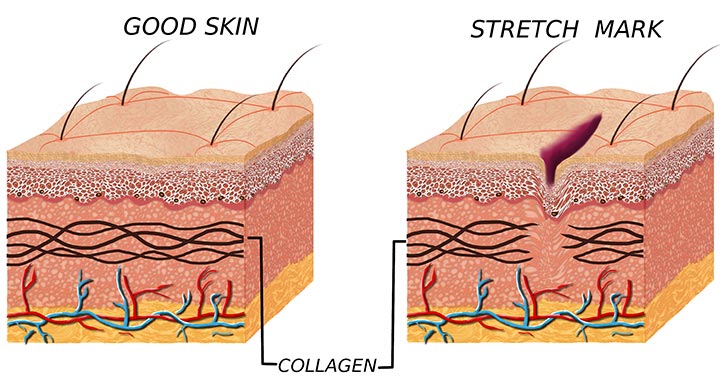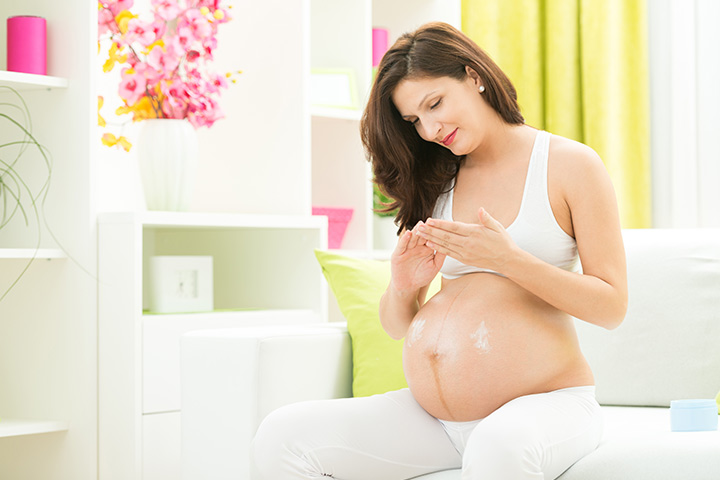
Image: Shutterstock
Stretch mark creams are considered essentials for moms-to-be but are they all that they are cracked up to be? The latest research suggests that you might want to rethink them.
You may have thought that you would get rid of those lines on your thighs and belly with cream, that it would be your miracle cure.But is it really so?
1. Are Stretch Mark Creams Effective?
Expert dermatologist Frank Wang, M.D. who is an assistant professor at the University of Michigan led a research study (1) which highlighted the fact that stretch mark creams are not the miracle products that they’re often toutedas.
Wang first started the study as he wanted to limit the stress that every pregnant woman goes through, as this is just another part of pregnancy that affects existing low self-esteem.
Sadly, the study suggested that creams aimed at reducing stretch marks are simply ineffective. All that belly and thigh rubbing, not least the lighter wallet you’ve been carrying around, might have all been in vain.
“Most of the existing products aren’t based on solid scientific research. Very few to none of the items touted to prevent or fix stretch marks really work.” – Frank Wang M.D
2. The Basic Biology Of Skin
The skin is the largest organ on the body, and so it’s natural that we would want to take care of it.
There are several layers of skin and the second one, known as the dermis, is the one that holds the elastic fibers that Dr. Wang’s study was focused on. Changes occur to the dermis during pregnancy, which causes these lines of motherhood.
3. Natural Healing for Stretch Marks
Some of the researchconducted hasshown one shining bit of good news. That prevention might be a much more effective way of combating stretch marks than a later cure (2). Rather than focusing on trying to repair damaged skin after the incidence of stretch marks, why not consider prevention instead?
Before you go and glare at yourself in the mirror, Dr. Wang has suggested that quite a few natural remedies can aid stretch marks by preventing them in the first place, by simply taking care of existing elastic fibers.
The dermatologist acknowledged that there is some scientific evidence that supports the use of bitter almond oil in stretch mark prevention during pregnancy. If you go back a few generations, women would swear by almond oil, cocoa butter, coconut oil and olive oil, but as of now, none of these have any conclusive proof that they actually work to prevent stretch marks.
Regardless, with the usage of such oils, at least your skin will remain moisturized. It is always safer to put these pure base oils on your skin than products with unknown ingredients and chemical preservatives.
4. Diet, Exercise & Massage
Taking care of three obvious factors can help in the prevention as well as in curingstretch marks, the trifecta of a healthy diet, ample exercise and massage:
Packing in the leafy greens and eating enough protein are just a couple of ways in which you can ensure the prevention of stretch marks (3). Exercise, such as aerobics, yoga or other stretching forms, especially during your second trimester can help keep the excess weight gain at bay, reducing stretch marks in the process.
Opting for regular massages, by a certified masseur trained in pregnancy massage can also help with the reduction of stretch marks (4).
5. Future Stretch Mark Saviors
According to existing scientific evidence (5), a plant-derived ingredient known as Centella, found in some topical creams, as well as products that contain hyaluronic acid, might help prevent stretch marks, but these claims are from older studies that need to be researched further.
Dr. Wang is now looking into collagen, to see if that could be a possible cure for stretch marks.
If you are disappointed by the latest research, just remember one thing ladies: stretch marks are a statement of motherhood. You are not alone: 50 to 90 percent of all pregnant women have them. Stand proud and embrace them!















